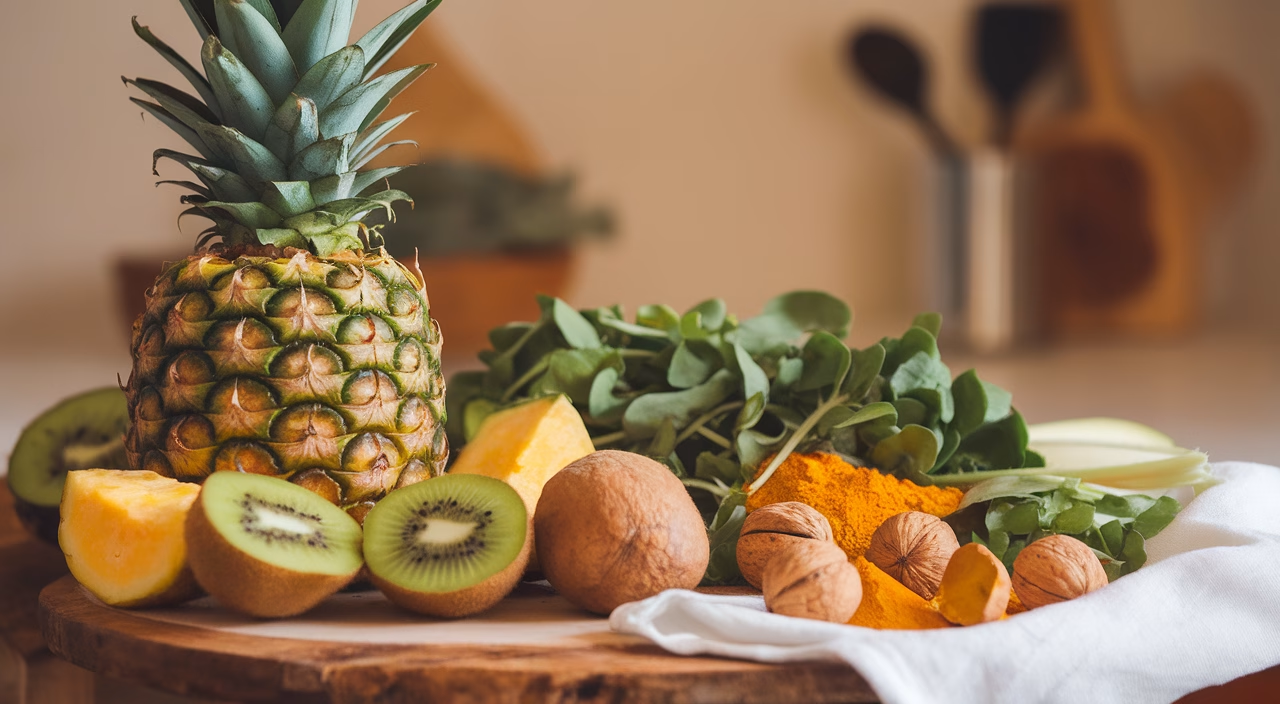What are the best foods that help reduce snoring naturally?
The best foods that reduce snoring naturally are those that support healthy airways, reduce inflammation, and prevent mucus build-up. These include antioxidant-rich fruits, anti-inflammatory vegetables, omega-3 fatty acids, and hydrating herbal teas. A consistent and balanced snoring diet can improve airflow and help you sleep better with natural snoring remedies.
TL;DR Summary
- Snoring often stems from blocked airways, poor sleep posture, or inflammation
- A snoring diet can reduce mucus and inflammation, easing airflow
- Foods that reduce snoring like kiwi, turmeric, leafy greens, and nuts can reduce snoring symptoms
- Avoid dairy, alcohol, and processed foods that worsen snoring
- Make changes gradually by adding a few snore-friendly foods daily
- Pair dietary tweaks with lifestyle shifts like sleeping on your side and staying hydrated
Understanding Snoring and Its Causes
Let’s be honest — snoring is often treated like a harmless nighttime annoyance, but if you or your partner are losing sleep each night, it quickly becomes personal. Snoring doesn’t just disrupt your sleep; it can also indicate underlying health issues that require natural snoring remedies. Here’s what’s really going on when you’re trying to improve sleep quality.
Snoring occurs when airflow through your mouth and nose is physically blocked during sleep. This can be due to various reasons such as:
- Nasal congestion from allergies or colds
- Poor muscle tone in the throat and tongue
- Obesity or weight around the neck
- Sleeping on your back
- Consuming alcohol before bed
When airflow is restricted, tissues at the back of your throat vibrate — that’s the classic snoring sound. But what many people don’t realize is that your diet can either worsen or ease that blockage substantially when you’re learning how to stop snoring naturally.
The Impact of Diet on Snoring
The saying “you are what you eat” rings especially true when it comes to snoring. Inflammation, mucus build-up, and dehydration — all diet-related conditions — can contribute massively to poor nighttime breathing and affect your ability to improve sleep quality.
Think of your airway like a narrow tunnel. Foods that cause inflammation or excess mucus can clog up that tunnel and reduce airflow. On the flip side, some foods have the opposite effect: they act like gentle cleaners, keeping everything open, smooth, and quiet.
Ever notice how a glass of milk makes you feel congested or how a salty dinner leaves your throat dry? That’s diet influencing your sleep, often quietly sabotaging your rest. Fortunately, once you become aware, it’s surprisingly easy to shift toward foods that reduce snoring with a snoring diet.
Surprising Foods that Can Help Ease Snoring
Here are key foods that reduce snoring that do more than just taste good — they actively support better breathing and reduced snoring as natural snoring remedies:
1. Turmeric
This anti-inflammatory powerhouse can reduce swelling in your nose and throat. Try it in warm milk alternatives with a pinch of black pepper for absorption as part of your snoring diet.
2. Leafy Greens
Spinach, kale, and Swiss chard are rich in magnesium and folate, supporting muscle function and reducing oxygen blockage while sleeping. These foods that reduce snoring naturally improve sleep quality.
3. Pineapple
Loaded with the enzyme bromelain, pineapple reduces nasal swelling and helps clear airways naturally, making it one of the most effective natural snoring remedies.
4. Kiwi
A proven sleep-enhancer, kiwi also supports immune function, reducing inflammation that might block your airways when you’re trying to improve sleep quality.
5. Walnuts & Almonds
These are high in omega-3 fatty acids, which help reduce inflammation and support the health of respiratory tissues, making them excellent foods that reduce snoring.
6. Herbal Teas
Chamomile and peppermint teas calm throat tissues and assist nasal drainage, which in turn can reduce snoring intensity as part of learning how to stop snoring naturally.
Avoid These Snore-Worsening Foods
| Food | Why It Worsens Snoring |
|---|---|
| Dairy | Increases mucus production |
| Alcohol | Relaxes throat muscles too much |
| Processed meats | High sodium increases airway dehydration |
| Sugar-laden snacks | Triggers inflammation response |
Tips for Incorporating Snore-Reducing Foods into Your Diet
Making better nighttime choices doesn’t mean overhauling your kitchen overnight. Instead, these small strategies help you build momentum with foods that reduce snoring:
- Swap cow’s milk with almond, oat, or coconut milk
- Add spinach or kale to breakfast smoothies
- Snack on kiwi or pineapple slices after dinner
- Replace desserts with antioxidant-rich berries
- Choose nuts over chips for salty cravings
The goal is sustainability with your snoring diet. You don’t need a perfect diet — just consistent, positive steps toward natural snoring remedies that help you improve sleep quality.
Cost Guide: Eating Healthy to Snore Less
Many clients tell me they worry snore-friendly diets might be expensive. Actually, most foods that reduce snoring are affordable staples:
| Item Type | Low-End | Mid-Range | High-End (Organic) |
|---|---|---|---|
| Leafy Greens (per bunch) | $1.50 | $2.50 | $4.00 |
| Herbal Teas (20 bags) | $3.00 | $6.00 | $10.00 |
| Kiwi (per lb) | $2.00 | $3.50 | $5.00 |
| Nuts (per lb) | $5.00 | $8.00 | $13.00 |
Creating a Sleep-Friendly Environment
Even the best snoring diet won’t do much if your sleep environment is sabotaging your rest. Here’s how to optimize your bedroom setting to improve sleep quality:
- Keep it cool: Between 60–67°F is ideal
- Declutter and use blackout curtains to reduce cognitive and light stimulation
- Use a humidifier if the air is dry, which can irritate airways
- Elevate your head by 4–6 inches using an adjustable pillow or wedge
- Sleep on your side, not your back — this prevents tongue fallback
When combined with foods that reduce snoring, a few tweaks to your bedroom can lower snoring dramatically as part of natural snoring remedies.
Final Thoughts: Let Food Be Your Nighttime Medicine
If you’re tired of restless nights, or your partner has nudged you one too many times because of loud snoring, it’s worth exploring just how influential your snoring diet can be. By gradually incorporating anti-inflammatory, airway-clearing foods that reduce snoring into your routine, you’re not only improving your sleep quality — you’re taking back your nights naturally.
Remember, snoring isn’t just a nighttime issue. It affects how you show up during the day, your energy, and even your mood. Let smart eating be your silent ally in getting better rest through natural snoring remedies and learning how to stop snoring naturally.
Frequently Asked Questions
- What foods reduce snoring the most effectively?
- Leafy greens, kiwi, pineapple, turmeric, and omega-3-rich nuts like walnuts and almonds show the strongest effects in reducing snoring.
- Can dairy really make snoring worse?
- Yes. Dairy increases mucus production, which can block nasal passages and enhance snoring during sleep.
- How quickly can you see results from a snoring diet?
- Some people notice improved breathing and less snoring in 1–2 weeks, especially when combined with sleep position adjustments and hydration.
- Is alcohol a major snoring trigger?
- Absolutely. Alcohol relaxes throat muscles excessively, making it easier for breathing passages to collapse during sleep.
- Are there any drinks that help prevent snoring?
- Herbal teas like chamomile and peppermint reduce throat inflammation and dryness, which are two major snoring triggers.
- Does losing weight help reduce snoring?
- Yes. Excess weight, especially around the neck, puts pressure on your airway. Dropping even 5–10 pounds can reduce snoring significantly.
- Are snoring strips better than snoring diets?
- Snoring strips can help positionally, but long-term results often come from dietary and lifestyle changes that target root causes.





